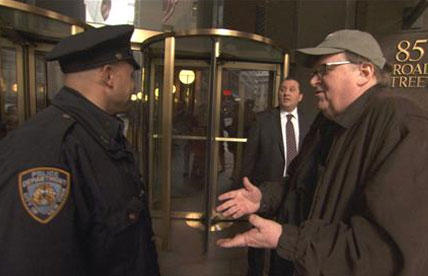
You can’t go to a Michael Moore movie without knowing what you’re getting into. You’ve already made up your mind years ago whether or not you agree with Moore or you don’t. Moore’s latest movie, “Capitalism: A Love Story,” will probably not change your mind.
“Capitalism,” is, at times, more of a thought piece than Moore’s other movies. As it opens, Moore compares the current state of the US with Rome, using one of those old educational movies that you probably slept through in school. He also wonders aloud what those in the future will think of the US. Will we be a civilization best remembered for posting videos of our animals on-line, or will we be remembered best for evicting each other from our homes?
He then goes back to see how the US got here. He examines the actions of the banks, taking out insurance policies on their workers, garnering millions of dollars when they die, while the deceased family receives nothing. He shows that these are referred to in the industry as, ‘dead peasants.’ He also shows how underpaid airline workers are, how companies are shutting down, not paying employees the wages they were due. He also looks at derivatives and how the stock market got to where it was, how the attitude seemed to be, if you aren’t smart enough to know how to make the law work for you, you don’t deserve to prosper. Moore also discusses the concept of the American dream, wondering if it is still possible. He also wonders if capitalism is part of that dream.
In an era of town halls and charges of socialism, “Capitalism: A Love Story,” presents the facts in a way that, when you see it all laid out, you clearly see the parallels that Moore is drawing. According to him, you either care about other people, and think that the way things are going need to change, or you only care about yourself and don’t want to change a thing. Agree or disagree, you must concede that Moore definitely has enough evidence to back up his charges.
“Capitalism,” may not be Moore’s best movie, (though the evidence in it is as damning as it was in “Fahrenheit 9/11,” or “Sicko,”) but it’s his most personal. He goes back home to Flint, and talks with his father, and sees giant flat surface that used to be the auto manufacturer’s plant where he worked. But in what may ultimately be the best part of the movie, Moore ends on an up note. He pleads with the audience that agrees with him to do something. Stand up. Say something. Let people know how you feel. “Capitalism” feels more empowering than his other movies which, as enraging and informative as they were, sometimes felt like things were going to hell and we could nothing to stop it. Here, Moore says it’s not too late. If you want to make a change, start doing something. It’s a simple message and, probably shouldn’t take a feature movie to say it. However, sometimes you need to be reminded of the right thing to do. Moore does a great job of doing that. “Capitalism: A Love Story,” is highly recommended. -Sam

One thought on “Review: Capitalism: A Love Story”